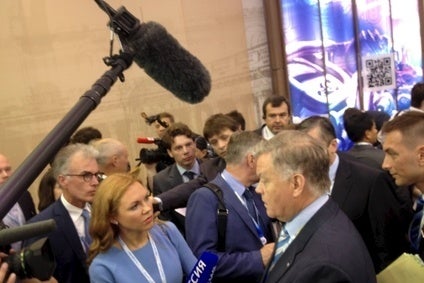What to make of last week’s St Petersburg International Economic Forum? (SPIEF).
If a week’s a long time in politics it seems a generation ago that last year’s event, also in the former Russian capital was all bonhomie and positivity.
That was swiftly followed by The Kremlin’s hosting of the G20 summit, equally in the former Leningrad and at which Mitsubishi in the guise of MMC Rus, supplied 70 I-MiEVs to President Putin and his entourage, as well as German Chancellor, Angela Merkel.
Fast forward 12 months and the political landscape has shifted so dramatically, it is scarcely recognisable as the one that was all smiles at those final communiques.
Russia’s extraordinary acquisition – some would argue reacquisition – of Crimea from Ukraine – or as Lord Peter Mandleson put it in fiery language last week at SPIEF – “illegal annexation” – has resulted in The Kremlin very firmly being left out in the cold most noticeably with the G8 slimming down to become the G7 – for now.
Some very public pressure was applied on US and UK companies in particular not to attend SPIEF – populated almost exclusively at CEO level – not to mention Prime Minsters and Presidents – but it seems most did turn up despite being labelled by some as ‘Kremlin lackeys.’
So the the vast majority of the 6,500 delegates made the trip north, flanked by a staggering number of 1,500 journalists and I think that was the thrust of it, to talk through the media and give Russia PLC’s point of view.
Not in any ‘lackey’ sense from the media, although the Russia 24 TV station, which was there would make some of the old Soviet Pravda news agency blush, but Moscow is fighting its PR corner and this is one way to it thinks it can do it.
But Moscow – or St Petersburg in this case – didn’t get it all its own way – far from it as former European Union Trade Commissioner Mandelson gave Russia both barrels when it came to Crimea.
It’s a while since Mandelson popped up in a public forum – he was famously at the heart of British Prime Minister Tony Blair’s inner circle in the rise of New Labour to power – and he has been universally feted as the architect of Britain’s Automotive Council – a body that has won praise across the political divide.
Mandelson was there in his role as president of left-leaning thinktank Policy Network – and kicked off the Global CEO Summit element of SPIEF in rumbustious form.
“I think the job of friends of Russia and Russian business is to be candid as well as supportive,” he said. “Overall, this year’s Forum is an occasion for realism and there is a great deal riding for the Russian economy on what happens, particularly in the coming few months.”
“Events in Ukraine, including the illegal annexation of Crimea, have brought some short-term tactical advantage to Russia, but in my view…the wider political instability it has sparked may turn this into a pyrrhic victory.”
Sat in the audience as Mandelson spoke was Russian Railways (RZD) president Vladimir Yakunin – I was right behind him – one time fellow resident of St Petersburg as is Vladimir Putin – and reportedly on the US sanctions list of Kremlin confidants.
Yakunin – who authored the acquisition of PSA Peugeot Citroen’s logistics division GEFCO for EUR800m (US$1.1bn) – gave a robust defence of Russia’s aims noting: “I would like to reassure Mr Obama and Mr Cameron of the reindustrilisation of the [Russian] economy.”
I asked Yakunin about Gefco and his aspirations for RZD with the French logistics company, but he deftly swerved the question and me, by saying he had another engagement.
Nonethless, the RZD chief provided a genuine counterpart to Mandelson’s “less State more private enterprise” mantra, arguing the International Monetary Fund no less, had urged “government investment in infrastructure is most likely the right way to counter the consequences of the recession.
“Infrastructure can give a real impetus to GDP growth,” he continued. “Society does not care about GDP percentages, society cares about the quality of living for each citizen.”
And just to ram the interventionist point home in case Mandelson needed reminding, Yakunin quoted Henry Ford. “‘Caring for the well-being of a country is a duty of all us.'”
That polarity of view was quite a theme of SPIEF, naturally dominated by Russia’s giant energy suppliers such as Gazprom and Novatek, but there were perhaps more pleas for moderation.
That was echoed in the shape of former Mercedes CEO, Eckhard Cordes, who urged delegates to work with the country, citing German businesses who wished to avoid the imposition of punitive sanctions.
“I would ask you to do everything you to restore international confidence in Russia as a business location,” said Cordes to delegates.
“Building Europe without Russia is difficult – building Europe against Russia is impossible.”
Despite events on the ground in Ukraine seemingly gaining momentum by the day, Moscow appears to have taken somewhat of a back seat lately, urging a peaceful resolution to the crisis and this genuinely came across as a backdrop at this year’s SPIEF.
Perhaps the mood was given a focus by LMC, which recently painted a bleak assessment of Russia’s automotive market, predicting a precipitous fall of 10% this year, following on from 2013’s drop of 5%.
Business leaders in St Petersburg were urging calm heads prevail and with so many automakers present in Russia – whether as OEMs or suppliers – that sentiment is surely one that resonates.
AvtoVAZ CEO, Bo Andersson, told me he thought it would take two years for the Russian market to recover its former buoyant status.
With interest rates rising in Russia to 7.5%, inflation on the up and a flight of capital thought to have started well before the current political crisis, Moscow needs those calm heads to also extend to Washington and London.







